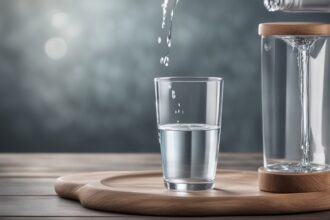Water fasting, a practice of abstaining from all food and drink except water for a set period, has gained popularity for its potential health benefits, including detoxification, weight loss, and improved mental clarity. However, one of the most critical aspects of a successful and safe water fast, especially during extended periods, is maintaining optimal hydration during extended fasts. Without proper hydration strategies, the body can suffer from dehydration, electrolyte imbalances, and other complications. In this comprehensive guide, we’ll explore how to stay hydrated, the importance of water quality, and practical tips to ensure your fast is both safe and effective.
The Importance of Optimal Hydration During Extended Fasts
During a water fast, your body relies solely on water to sustain vital functions, flush out toxins, and maintain overall homeostasis. Optimal hydration during extended fasts is not just about drinking water—it’s about ensuring the body receives the right amount and quality of water to prevent dehydration. Dehydration can lead to symptoms like dizziness, fatigue, headaches, and in severe cases, organ dysfunction. Since you’re not consuming food, which typically provides a small percentage of daily water intake, you must be intentional about meeting your hydration needs. Studies suggest that the average person needs about 2–3 liters of water daily, but this can vary based on factors like body weight, climate, and activity levels.
Signs of Dehydration to Watch for During a Fast
Recognizing the early signs of dehydration is crucial for maintaining optimal hydration during extended fasts. Common symptoms include dry mouth, dark urine, lethargy, and headaches. More severe signs, such as rapid heartbeat, confusion, or fainting, indicate a medical emergency. Since fasting can alter how your body signals thirst, it’s essential to drink water proactively rather than waiting for thirst to kick in. Monitoring urine color is a practical way to gauge hydration—aim for a pale yellow color as a sign of proper fluid balance. If you notice any concerning symptoms, consider breaking your fast and seeking medical advice.
How Much Water Should You Drink During an Extended Fast?
Determining the right amount of water for optimal hydration during extended fasts depends on individual needs. A general guideline is to aim for at least 2–3 liters (or 8–12 cups) of water per day, but larger individuals or those in hot climates may need more. Listen to your body and adjust accordingly. Overhydration is also a risk, as it can dilute electrolytes and lead to a condition called hyponatremia. To avoid this, sip water throughout the day rather than chugging large amounts at once. Some fasting experts recommend spacing out intake into smaller, frequent doses to maintain a steady hydration level without overwhelming the system.
For more insights on balancing water intake, check out our related post on Hydration Tips for Beginners.
The Role of Water Quality in Fasting Hydration
Not all water is created equal, and the quality of water you consume plays a significant role in achieving optimal hydration during extended fasts. Tap water may contain contaminants like chlorine or heavy metals, which can burden the body during a detox-focused fast. Filtered or spring water is often recommended to ensure purity. Additionally, some fasters add a pinch of high-quality sea salt to their water to replenish sodium lost through urine, though this should be done cautiously and under guidance. Avoid sugary or flavored drinks, as they break the fast and defeat the purpose of water-only fasting. For a deeper dive into water choices, read our article on Choosing the Best Water for Fasting.
Electrolyte Balance and Hydration During Long Fasts
While water is the cornerstone of hydration, extended fasts can deplete essential electrolytes like sodium, potassium, and magnesium, which are critical for nerve function, muscle activity, and fluid balance. Optimal hydration during extended fasts often involves addressing this imbalance. While pure water fasting excludes additives, some individuals on modified fasts or under medical supervision may use electrolyte supplements or trace mineral drops. If you’re experiencing muscle cramps, fatigue, or heart palpitations, it might be a sign of an electrolyte deficiency. Always consult a healthcare provider before adding anything to your water. For more on this topic, explore our guide to Managing Electrolytes During Fasting.
Practical Tips for Staying Hydrated During an Extended Fast
Achieving optimal hydration during extended fasts requires planning and mindfulness. Here are some actionable tips to help you succeed:
- Set a Schedule: Plan to drink small amounts of water every hour to avoid dehydration or overhydration.
- Carry a Water Bottle: Keep a reusable bottle with you to track intake and ensure constant access to water.
- Monitor Your Body: Pay attention to urine color, energy levels, and any signs of discomfort.
- Rest More: Reduce physical activity during extended fasts to minimize water loss through sweat.
- Avoid Extreme Heat: Stay in cool environments to prevent excessive sweating and dehydration.
For additional fasting strategies, check out our post on Safety Tips for Extended Fasting.
Disclaimer: The information provided in this article is for educational purposes only and should not be considered medical advice. Water fasting, especially for extended periods, can pose health risks and is not suitable for everyone. Always consult with a healthcare professional before starting any fasting regimen, particularly if you have pre-existing medical conditions, are pregnant, or are on medication. The authors and publishers of this content are not responsible for any adverse effects resulting from following the suggestions outlined in this post.
References
- Institute of Medicine. (2005). Dietary Reference Intakes for Water, Potassium, Sodium, Chloride, and Sulfate.
- Mayo Clinic. (2022). Water: How much should you drink every day?
- Harvard Health Publishing. (2021). The importance of staying hydrated.
- Centers for Disease Control and Prevention. (2023). Water and Healthier Drinks.
- WebMD. (2022). Water and Your Diet: Staying Hydrated.
This content is for informational purposes only and not a substitute for professional advice.






